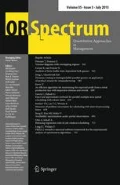Abstract
For the nonpreemptive two machine job-shop scheduling problem with a fixed number of jobs and objective functions Σf i and maxf i , wheref i are nondecreasing functions of the finish times of jobsi, polynomial algorithms are presented. This answers previous open questions about the complexity status of the corresponding problems with objective functionsL max, Σw i U i , and Σw i U. We generalize these results by showing that the problem with any regular criterion can be solved in polynomial time.
Zusammenfassung
Für das Zweimaschinen-Job-Shop-Problem ohne Arbeitsunterbrechnungen und den Zielfunktionen Σf i bzw. maxf i , wobei dief i monotone Funktionen der Fertigstellungszeiten der Jobsi sind, werden für den Fall fester Jobanzahlen polynomiale Algorithmen angegeben. Dies beantwortet insbesondere die bislang offene Frage nach dem Komplexitätsstatus des obigen Problems für die ZielfunktionenL max, Σw i U i , und Σw i U. Schließlich zeigen wir, daß das Problem mit beliebiger regulärer Zielfunktion ebenfalls polynomial lösbar ist.
Similar content being viewed by others
References
Ahuja RK, Magnanti TL, Orlin JB (1993) Network Flows. Prentice Hall, Englewood Cliffs
Blazewicz J, Ecker K, Schmidt G, Weglarz J (1993) Scheduling in Computer and Manufacturing Systems. Springer, Berlin Heidelberg New York
Brucker P (1988) An efficient algorithm for the job-shop problem with two jobs. Computing 40:353–359
Brucker P (1994) A polynomial algorithm for the two machine job-shop scheduling problem with a fixed number of jobs. OR Spektrum 16:5–7
Brucker P (1995) Scheduling Algorithms. Springer, Berlin
Domschke W, Scholl A, Voß S (1993) Produktionsplanung. Springer, Berlin
Garey MR, Johnson DS, Sethi R (1976) The complexity of flowshop and jobshop scheduling. Math Oper Res 1:117–129
Jackson JR (1956) An extension of Johnson's results on job lot scheduling. Naval Research Logistic Quarterly 3:201–203
Kravchenko SA, Sotskov YN (1996) Optimal makespan schedule for three jobs on two machines. Z Oper Res 43:233–238
Kravchenko SA, Sotskov YN (1995) Complexity of the two machine job-shop scheduling problem with a fixed number of jobs. Central European Journal for Operations Research and Economics (submitted for publication)
Lenstra JK, Rinnooy Kan AHG, Brucker P (1977) Complexity of machine scheduling problems. Ann Discr Math 1:343–362
Sotskov YN (1985) Optimal scheduling two jobs with regular criterion. In: Design Process Automating. Institute of Engineering Cybernetics Minsk, pp 86–95
Sotskov YN (1991) The complexity of shop-scheduling problems with two or three jobs. Eur J Oper Res 53:326–336
Sotskov YN, Shakhlevich NV (1995)NP-hardness of shop-scheduling problems with three jobs. Discr Appl Math 59:237–266
Author information
Authors and Affiliations
Additional information
Supported by the International Association for the promotion of cooperation with scientists from the independent states of the former Soviet Union, Project INTAS-93-257.
Rights and permissions
About this article
Cite this article
Brucker, P., Kravchenko, S.A. & Sotskov, Y.N. On the complexity of two machine job-shop scheduling with regular objective functions. OR Spektrum 19, 5–10 (1997). https://doi.org/10.1007/BF01539799
Received:
Accepted:
Published:
Issue Date:
DOI: https://doi.org/10.1007/BF01539799




